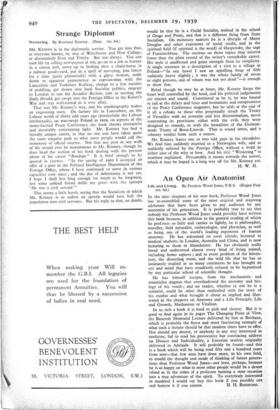MR. KENNEY is in the diplomatic service. You get into
that, as everyone knows, by way of Winchester and New College, or alternatively Eton and Trinity. But not always. You can start life by selling newspapers at ten, go on to a job as learner in a cotton mill, move up to looking after a chain-horse in a railway goods-yard, put in a spell of navvying, join forces for a time (quite platonically) with a gipsy woman, settle down to apparent permanence as capstan-man with the Lancashire and Yorkshire Railway, change to a few months of peddling, get drawn into local Socialist politics, migrate to London to run the Socialist Review, join in starting the Daily Herald, get swept into the Foreign Office in the Kaiser's War and stay well-rooted in it ever after.
That was Mr. Kenney's way, and his autobiography makes an engrossing story. On factory life in Lancashire, on the Labour world of thirty odd years ago (particularly the Labour intellectuals), on war-swept Poland in 1919, on aspects of the many-faceted Peace Conference, the book throws instructive and invariably entertaining light. Mr. Kenney has had a literally unique career, in that no one can have taken quite the same singular path to what most people would call the monotony of official routine. Not that any post or any walk of life would ever be monotonous, to Mr. Kenney, though he does head the section of his book dealing with the present phase of his career " Bondage." It is brief enough to be quoted in extertso. " In the spring of 192o I accepted an offer of a post in the Political Intelligence Department of the Foreign Office, where I have continued to serve in various capacities ever since ; and the day of deliverance is not yet. I hope I shall live long enough for much to be forgotten, lest some unkind friend defile my grave with the epitaph ' He was a civil servant.' "
This seems a little harsh, seeing that the Socialism of which Mr. Kenney is so ardent an apostle would turn half the population into civil servants. But his reply to that, no doubt,
would be that he is a Guild Socialist, trained in the school of Orage and Penty, and that is a different thing from State Socialism. On monetary matters he is a disciple of Major Douglas and other exponents of social credit, and in the spiritual field (if spiritual is the word) of Ouspensky, the sage of Fontainebleau. The sections on those topics may interest fewer than the plain record of the writer's remarkable career. His style is unaffected and gains strength from its simplicity. A single sentence in a description of a visit to a village in Poland—" In one hovel I saw an appalling heap of filth suddenly heave slightly ; it was the whole family of seven or eight persons, one of whom was not yet dead "—is enough to show that.
Rebel though he may be at heart, Mr. Kenney keeps the heart well controlled by the head, and his political judgements are sincere and sound. Constituted as he is, he was bound to rail at the delays and fears and hesitations and compromises of the Peace Conference magnates, but he adds at the end of it all a rebuke to those who perpetually attack the Treaty of Versailles with no restraint and less discrimination, never contrasting its provisions either with the evils they were designed to remedy, or with the brutalities of the German- made Treaty of Brest-Litovsk. That is sound sense, and a salutary verdict from such a source.
Mr. Kenney leaves one or two odd gaps in his chronicles.
We find him suddenly married to a Norwegian wife, and as suddenly enlisted by the Foreign Office, without a word in either case of the why or how. And his title " Westering " is nowhere explained. Presumably it means towards the sunset, which it may be hoped is a long way off for Mr. Kenney yet.
H. W. H.






























 Previous page
Previous page